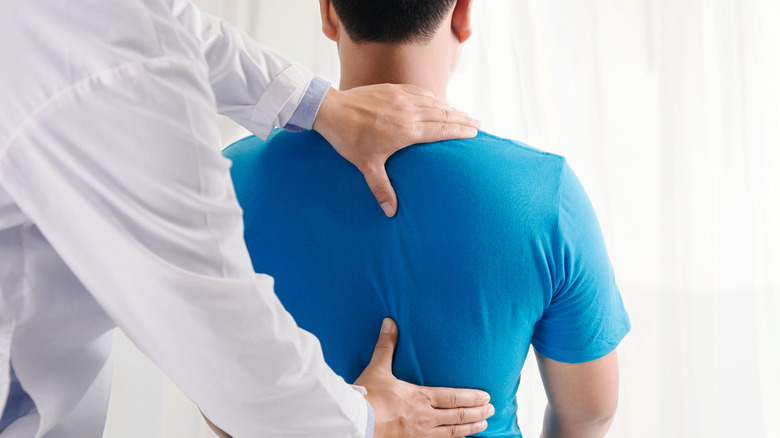What Does It Mean When You Have Lower Back Pain?
Whether you sit at a desk all day, carry heavy boxes around, or don't feel like you do any activities that would be hard on your body, you've probably felt lower back pain at some point in your life. This issue is incredibly common and can be caused by a variety of factors. According to Healthline, most causes of lower back pain stems from injuries like "muscle sprains or strains due to sudden movements or poor body mechanics while lifting heavy objects." Back pain can last anywhere from three days if it is acute to more than three months if it is chronic.
Back injuries can be caused by everyday events, like lifting something too heavy or tripping and falling. The muscles and ligaments in the back can get pulled or tear after excess activity working that area. A herniated disc, which is when a spinal disc pushes against the nerves in the back, can also cause pain in that area. This injury becomes more common as you age. Your pain may also be caused by sciatica, which is a condition that causes pain to radiate from your lower back down to your legs. It can be caused by issues like a herniated disk, bone spur, or other spinal problems. These can compress spinal nerves and cause pain, inflammation, and numbness.
Treatments for back pain will depend on the cause
If your lower back pain is coming from a strained muscle or stiffness, it should go away on its own after some rest (via Cleveland Clinic). If your pain is severe but doesn't require surgery or another treatment, your doctor may give you prescription-strength painkillers to help you cope with the pain while you heal. Physical therapy is sometimes necessary for people with chronic back pain. You should visit a doctor about your pain if it doesn't subside within a few days or if your pain is interfering with your daily activities.
While injuries and diseases that can cause lower back pain can't always be avoided, there are ways that you can decrease your chances of developing this condition. Excess weight can put pressure on your spine, so eating healthy can help you avoid putting on extra pounds that might hurt your back. A regular exercise routine will build the muscles in your core and help you prevent injury. If you sit all day for your job, make sure you maintain good posture at your desk with an ergonomic chair set at an ideal height. You should not be hunching over while you work. Be sure to get up from your desk every hour and move around to avoid strain on your back.


